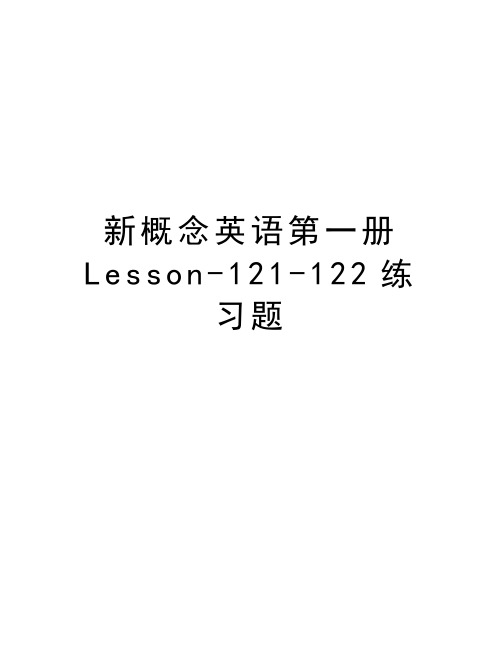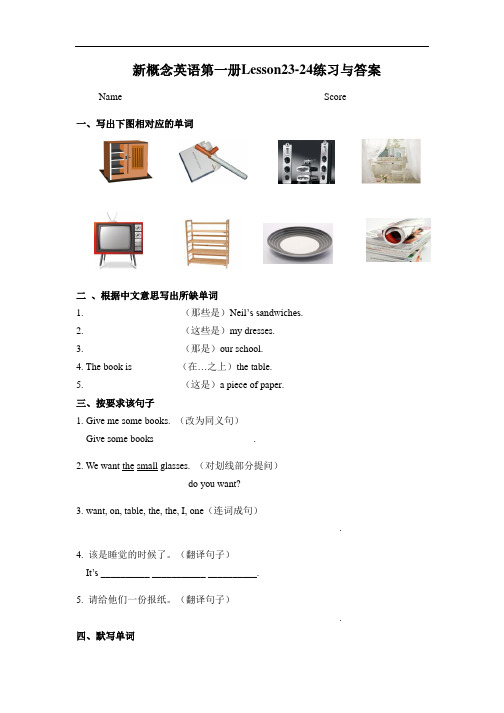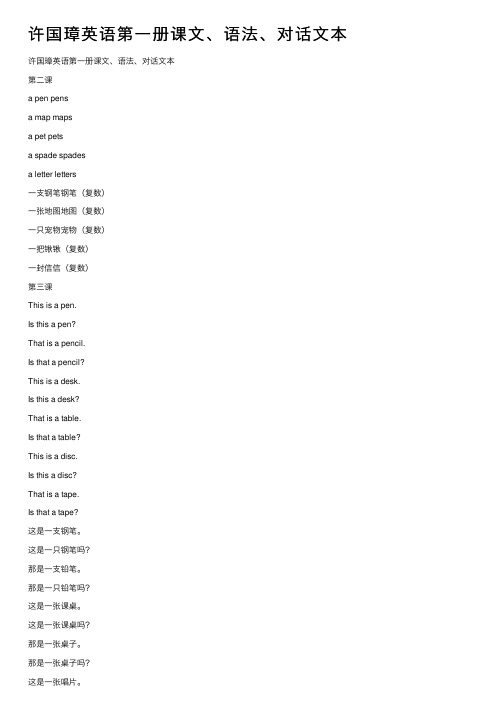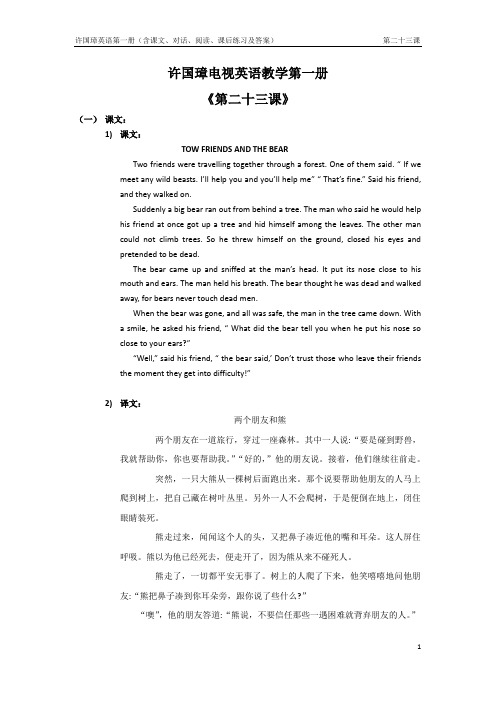许国璋英语第一册第二十二课课文、练习、答案
新概念英语第一册Lesson-121-122练习题知识讲解

新概念英语第一册L e s s o n-121-122练习题Lesson 121 and Lesson 122一根据句意填空(10分)1. You can look a new word up in a ______.2. I can’t remember your name. I’ve ______it.3. A ______ is a person who buys thing in a shop.4. The shop assistant ______ his buyers very well.5. The room serves ______ both bedroom and living-room.6. The lady ______ is standing behind the counter is the shop assistant.7. Dogs ______ people by their smell.8. The road is poor enough to be worth ______.9. This box is too heavy for me to ______.10. I forgot to take the umbrella ______ me.二填上一个适当的关系代词(10分)1. The dictionary ______ the gentleman bought half an hour ago was very expensive.2. The lady ______ is standing behind the counter is my sister.3. The man ______ I served was wearing a hat.4. There is only one thing ______ I can do.5. This is the boy ______ textbook was lost.6. The dog ______ is carrying the basket is mine.7. The film ______ we saw last week is good.8. He is the policeman ______ caught the thieves.9. That’s all ______ I know.10. He is the student ______ English is always at the top.三用所给词的适当形式填空(10分)1. He is the man ______ (who) I served yesterday.2. The shop keeper is standing behind the ______ (count).3. The door is open. I have forgotten ______ (open) it.4. The ______ (manage) is talking with the assistant.5. We must serve our ______ (custom) very well.6. I bought two expensive ______ (dictionary) here half an hour ago.7. I got the ______ (invite) letter yesterday.8. It is very ______ (noise) in the street.9. It happened to a friend of ______ (my) a year ago.10. You will understand me sooner or ______ (late).四用所给动词的适当形式填空(10分)1. After the thieves ______ (enter) the house, they went into the dining-room.2. They came to the party because Betty and Tom ______ (invite) them the day before last.3. The thieves ______ already ______ (go) before George went downstairs.4. Mary was doing her lessons while her brother ______ (play) games.5. This is the man whom I ______ (serve) yesterday.6. She finished her homework, then she went on ______ (do) the homework.7. When I ______ (leave) the house, the postman arrived.8. Just as I was opening the front door, the telephone ______ (ring).9. I couldn’t remember if I ______ (boil) the milk.10. She ______ (type) a letter when the boss arrived.五选择填空(15分)( ) 1. Don’t forget ______ the letter.A. postB. postingC. have postedD. to post( ) 2. The lady ______ served you last week is our assistant.A. whoB. whomC. whoseD. which( ) 3. The song ______ they are listening to is very good.A. whoB. whyC. whichD. whom( ) 4. He ______ in the army for some years.A. servedB. stayedC. leftD. remained( ) 5. He is new here. Only a few people ______ him.A. understandB. recognizeC. helpD. greet( ) 6. He ______ doing his homework by ten o’clock last night.A. finishedB. has finishedC. had finishedD. hadn’t finish( ) 7. The train ______ when I ______ to the station.A. was left; was gettingB. left; had gotC. had left; gotD. left; got( ) 8. They boy ______ watch is broke is crying.A. whoB. whoseC. whomD. which( ) 9. This is the best film ______ I have ______ seen.A. which, everB. that, everC. that, neverD. which, yet( ) 10. The members of the family ______ a bike to ride.A. each hasB. each haveC. has eachD. have each( ) 11. Everyone wants to know ______ last night.A. what was happened to himB. what happened about himC. what was happened about himD. what happened to him( ) 12. I was reading the book ______ Lily bought last week.A. whichB. whoC. whatD. where( ) 13. This is the most beautiful park ______ I have even visited.A. whichB. whoC. thatD. where( ) 14. I have told everything ______ I can to you.A. whatB. thatC. whichD. who( ) 15. Is the late beautiful? This photo will show you ______.A. how does it look likeB. what does it look likeC. how it looks likeD. what it looks like六句型转换(10分)1. I want to buy the books. They are on the counter.(把句子改写成定语从句)I want to buy the books ______ ______ on the counter.2. The woman is standing behind the counter. She served me.(把句子改写成定语从句)The woman ______ ______ standing behind the counter served me.3. The boy is clever. His eyes are big.(把句子改写成定语从句)The boy ______ ______ are big is clever.4. He is the man. I met him yesterday.(把句子改写成定语从句)He is the man ______ I ______ yesterday.5. This is the best film. I have ever seen it. (把句子改写成定语从句)This is the best film ______ I have ______ seen.6. She served tea and bread to us.(变为同义句)She ______ us ______ tea and bread.7. I forgot to take the two dictionaries with me.(就换线部分提问)______ ______ you forget to ______?8. The books which are on the counter belong to the gentleman.(就换线部分提问)______ ______ belong to the gentleman?9. He had changed so much. I couldn’t recognize him.(变为同义句)He had changed ______ much for me to ______.10. He had something that was important to do that day.(改为同义句) He had ______ ______ to do that day.七根据汉语提示完成句子(10分)1. 他就是我昨天接待的顾客。
新概念英语第一册Lesson23-24练习与答案

新概念英语第一册Lesson23-24练习与答案Name ____________ Score ____________ 一、写出下图相对应的单词____________ ____________ ____________ __________________________ ____________ _____________ ____________二、根据中文意思写出所缺单词1. __________ _________(那些是)Neil’s sandwiches.2. __________ _________(这些是)my dresses.3. __________ _________(那是)our school.4. The book is _________(在…之上)the table.5. __________ _________(这是)a piece of paper.三、按要求该句子1. Give me some books. (改为同义句)Give some books__________ __________.2. We want the small glasses. (对划线部分提问)__________ __________ do you want?3. want, on, table, the, the, I, one(连词成句)____________________________________________________.4. 该是睡觉的时候了。
(翻译句子)It’s __________ ___________ __________.5. 请给他们一份报纸。
(翻译句子)____________________________________________________.四、默写单词1._____________________2._____________________3._____________________4._____________________5._____________________新概念英语第一册Lesson23-24答案一、写出下图相对应的单词(3×8=24)cupboard cigarette stereo dressing tabletelevision shelf plate magazine二、根据中文意思写出所缺单词(4×9=36)1. Those are(那些是)Neil’s sandwiches.2. These are(这些是)my dresses.3. That is(那是)our school.4. The book is on(在…之上)the table.5. This is(这是)a piece of paper.三、按要求该句子(5× 5=25)1. Give me some books. (改为同义句)Give some books to me.2. We want the small glasses. (对划线部分提问)Which glasses do you want?3. want, on, table, the, the, I, one(连词成句)I want the one on the table.4. 该是睡觉的时候了。
新概念英语第一册自学笔记含课后练习答案:Lesson23-24

新概念英语第一册自学笔记含课后练习答案:Lesson23-24新概念英语第一册第23-24课课文详注 further notes on the text1.动词的双宾语在give me some glasses中,动词give后面有两个宾语,即直接宾语some glasses和间接宾语me。
人称代词作宾语时要用人称代词的宾格。
请参见lessons 21~22语法部分。
2.the ones on the shelf.是架子上的那几只。
本句是省略句,句首省略了i want。
句中的ones代表glasses。
on the shelf是介词短语,作定语,修饰ones。
3.these?这几只?是do you want these?的省略形式。
4.yes, please.是的,请拿给我。
当别人问你要不要某物而你同意要时,就可用这句话。
又如:假如你不同意要,则应说:no, thank you. 不,谢谢。
5.数字1,117,1,420,1,925,2,000的英文写法1,117----one thousand one hundred and seventeen1,420----one thousand four hundred and twenty1,925----one thousand nine hundred and twenty-five2,000----two thousand新概念英语第一册第23-24课语法 grammar in useon引导的介词短语(1)我们经常在名词、名词短语、代词或动名词前面用介词表示人物、事件等与其他人物、事件等之间的各种关系,如空间关系、时间关系、因果关系等。
介词始终带有宾语。
即使介词与宾语分开时,这种关系仍必定存有。
有很多固定的介词短语常可见到。
很多介词短语是由介词+名词(+介词)构成的,如:on time(准时),in the middle of(在……中间)。
许国璋英语第一册课文、语法、对话文本

许国璋英语第⼀册课⽂、语法、对话⽂本许国璋英语第⼀册课⽂、语法、对话⽂本第⼆课a pen pensa map mapsa pet petsa spade spadesa letter letters⼀⽀钢笔钢笔(复数)⼀张地图地图(复数)⼀只宠物宠物(复数)⼀把锹锹(复数)⼀封信信(复数)第三课This is a pen.Is this a pen?That is a pencil.Is that a pencil?This is a desk.Is this a desk?That is a table.Is that a table?This is a disc.Is this a disc?That is a tape.Is that a tape?这是⼀⽀钢笔。
这是⼀只钢笔吗?那是⼀⽀铅笔。
那是⼀只铅笔吗?这是⼀张课桌。
这是⼀张课桌吗?那是⼀张桌⼦。
这是⼀张唱⽚吗?那是⼀盘磁带。
那是⼀盘磁带吗?第四课Is this a pen?It is a green pen.It that a pencil?Y es, it is.It is a red pencil.Is this a desk?No, it isn't.It is a table.Is that a pick?No, it isn't.It is a spade.These are desks.Are these tables? No, they aren't.They are desks. Those are knives.Are those pencils? No, they aren't. They are knives.这是⼀⽀钢笔吗?是的。
这是⼀⽀绿⾊的钢笔。
那是⼀⽀铅笔吗?是的。
那是⼀⽀红⾊的铅笔。
这是⼀张课桌吗?不,不是。
它是⼀张桌⼦。
那是⼀把镐吗?不,不是。
它是⼀把锹。
这些是课桌。
许国璋英语第一册第二十四课课文、对话、练习题、答案

许国璋电视英语教学第一册《第二十四课》(一)课文:1)课文:INSPECTOR HORNBERG VISITS A SCHOOLThe classroom was very quiet. Outside, the leafless trees were white with the first snowfall. But not one pair of eyes stayed from the history books whichtwenty-five little girls were studying so earnestly.This was the year 1877, and the school was in Warsaw, Poland. A large part of Poland had been conquered by Russia. The Russia Tsar would not allow Polishchildren to study the history of their own country or even their own language. Buthere the teacher and her pupils were doing just that, although the Russians hadspies everywhere in Warsaw.Among the children was Manya Sklodovska. She was a very bright pupil. She was deep in the book she was reading. Suddenly there came the faint sound of a bell.Manya listened fearfully. Was it the signal? Yes! Two long rings, two short rings.Every head came up. Quick hands grabbed all the Polish history books off the desks, and hid them away. The girls swiftly took sewing materials from their desks.They began to embroider little squares of cloth.The outer door opened. There stood Inspector Hornberg.Hornberg had been put in charge by the Russians of the private schools of Warsaw. He was a heavy man in a tight-fitting yellow and blue uniform. With himwas Mademoiselle Sikorska, the head of the school.“ We have tow sewing classes a week, Mr. Inspector.” explained Mademoiselle Tupalska, the teacher “ I read to the children while they work.”“And what have you been reading to your pupils, Mademoiselle?”inspector Hornberg demanded.She held up her book “ Russian fairy tales.” She said.The inspector gave a grunt of approval. “Now,”he said, “I should like to question one of your pupils.”“Manya Sklodovska, please stand up.” The teacher said quietly.Manya rose from her seat without a word, trying not to tremble.“Recite the Lord’s Prayer in Russian.” Inspector Hornberg ordered.Manya recited the prayer in a low voice, careful not to show her feelings.“Now name the members of the Imperial Russian Family.”Manya gave the names.“now tell me.” Hornberg demanded, “ who is our ruler?”Manya’s face went pale. She opened her mouth, but the words would not come.“So, my little Polish patriot, you do not wish to tell me who rules over us.” the Russian inspector said. “answer me!”“His Majesty AlexanderⅡ, Tsar of All the Russia,” she said. But her voice was trembling.“That’s more like it,”Hornberg rose from his chair. “Now Mademoiselle Sikorska, I wish to visit one of the other classes.”“Certainly, Mr. Inspector, “ Mademoiselle Sikorska answered.When the door had closed upon them, the schoolgirls began to stir. Without a word, the teacher put her arms around Manya and kissed her. Manya was in tears.2)译文:霍恩伯格督学查看学校教室里鸦雀无声。
新概念英语一册Lessons121-122课后练习答案

新概念英语一册Lessons121-122课后练习答案新概念英语一册Lessons 121-122课后练习答案新概念英语第一册121-122课重点单词详解 Word studyrecognize v.(1)认出;理解:I recognize him now.我现在认出他来了。
Can you recognize this tune?你能听出这支曲调吗?(2)承认;确认:I recognize that he is more capable than I am.我承认他比我更有水平。
They recognized Richard as his lawful heir.他们确认理查德为他的合法继承人。
Are British medical qualifications recognized in other European countries?英国的医生执照在欧洲其他国家能否得到承认?serve v.(1)服务;接待;侍候:Are you being served, sir?先生,有人为您服务吗?A young waiter served them.一位年轻的侍者侍候他们进餐。
(2)供应;摆出(食物或饮料等):What time is breakfast served in this hotel?这个饭店里什么时候供应早餐?Serve it to the ladies first.把它先端给女士们。
(3)为……服务/服役;任职:The old cook has served the family for 30 years.这位老厨师已为这家干了30年了。
He began to serve in the Navy in 1960.他从1960年起开始在海军服役。
新概念英语第一册第122课课后练习答案Key to written exercisesA1 This is the car which the mechanic repaired yesterday.2 He is the man whom I invited to the party.3 These are the things which I bought yesterday.4 He is the man who came here last week.5 He is the policeman who caught the thieves.6 She is the nurse who looked after me.7 She is the woman whom I met at the party.8 I am the person who wrote to you. B1 Who met him? That woman?Yes, she's the woman who met him.2 Who sat there? That man?Yes, he's the man who sat there.3 Who made it? That woman?Yes, she's the woman who made it.4 Who read it? That man?Yes, he's the man who read it.5 Who shut it? That man?Yes, he's the man who shut it.6 Who took it? That woman?Yes, she's the woman who took it.7 Who told me? That man?Yes, he's the man who told me.8 Who saw me? That woman?Yes, she's the woman who saw me.C1 Whom did you see? That man? Yes, he's the man whom I saw.2 Whom did you telephone? That woman?Yes, she's the woman whom I telephoned.3 Whom did you invite? That man?Yes, he's the man whom I invited.4 Whom did you take to the cinema? That man? Yes, he's the man whom I took to the cinema.5 Whom did you find in the garden? That man? Yes, he's the man whom I found in the garden.6 Whom did you drive to London? That woman? Yes, she's the woman whom I drove to London.7 Whom did you hear? That woman?Yes, she's the woman whom I heard.8 Whom did you remember? That man?Yes, he's the man whom I remembered.。
lesson 22-21课练习和总结(句子结构)

Lesson 21-22课知识总结和练习2、give的用法:①give +...(人)+...(物)表示:把某物给某人即:give sb. sth.强调:sb.(人)如果用代词,必须使用人称代词的宾格。
因为,动词和介词之后必须是人称代词宾格。
②give me a pen. = give a pen to me. 都表示“给我一支钢笔。
”两种结构表达含义完全一样,都是表达“把某物给某人”;只是区别在人和物的位置不同。
③类似的单词还有:give(给)bring(带来)take(拿), lend(借给) pay(支付), pass(传递), read(读), tell(告诉), send(送;发送), show(给看),teach(教),hand(递给)等练习题:1、判断下列句子的句型类型(主谓宾写①,主系表写②)I love you. 我喜欢你. She rang me. 她打电话给我. I made a cake. 我做了蛋糕.He helped me.他帮了我. She sings songs.她唱歌. He gave me a book.他给我一本书. He likes animals,他喜欢动物. She is kind.她很善良. He is rude.他很粗鲁.I feel tired.我累了. She looked worried.她看起来很着急. I am fine.我很好.My hobby is reading,我的兴趣是阅读. The baby is a boy.婴儿是个男孩.The flowers smells good.花闻起来很香. It tastes delicious.尝起来很美味.2、a)改写句子。
(用to改写句子。
)1.Give George that letter. ___________________________________________________2.Give her those flowers. ____________________________________________________3. Give me that picture. _____________________________________________________4.Give Mr. Coco these books. _____________________________________________________5.Give the children these ice creams. _____________________________________________________b)改写以下句子(写出同义句)1. Give this key to Penny, please. _____________________________________________________________2.Don’t give that book to him. _______________________________________________________________3.Give these flowers to her. ___________________________________________________________________4.Don’t Give your homework to Sam.____________________________________________________________________5.Can you Give an English book to me? _____________________________________________________________________。
许国璋电视英语教学第一册第二十三课课文、练习、答案

许国璋电视英语教学第一册《第二十三课》(一)课文:1)课文:TOW FRIENDS AND THE BEARTwo friends were travelling together through a forest. One of them said. “ If we meet any wild beasts. I’ll help you and you’ll help me”“ That’s fine.” Said his friend,and they walked on.Suddenly a big bear ran out from behind a tree. The man who said he would help his friend at once got up a tree and hid himself among the leaves. The other mancould not climb trees. So he threw himself on the ground, closed his eyes andpretended to be dead.The bear came up and sniffed at the man’s head. It put its nose close to his mouth and ears. The man held his breath. The bear thought he was dead and walkedaway, for bears never touch dead men.When the bear was gone, and all was safe, the man in the tree came down. Witha smile, he asked his friend, “ What did the bear tell you when he put his nose soclose to your ears?”“Well,” said his friend, “ the bear said,’Don’t trust those who leave their friends the moment they get into difficulty!”2)译文:两个朋友和熊两个朋友在一道旅行,穿过一座森林。
- 1、下载文档前请自行甄别文档内容的完整性,平台不提供额外的编辑、内容补充、找答案等附加服务。
- 2、"仅部分预览"的文档,不可在线预览部分如存在完整性等问题,可反馈申请退款(可完整预览的文档不适用该条件!)。
- 3、如文档侵犯您的权益,请联系客服反馈,我们会尽快为您处理(人工客服工作时间:9:00-18:30)。
许国璋电视英语教学第一册《第二十二课》(一)课文:1)新课文:TOURISMModern means of transportation, communication, advertising and credit have all played a part in the growth of a giant new industry, tourism. Tourism is a serviceindustry. It does not sell a product that you can own but provides services on atemporary basis. the customer gets such things as a seat on a plane, a room in ahotel, and a chance to sit on a beach in the sunshine.Until modern times, a trip was often a long and difficult adventure. People had to travel by horse or camel or on foot. The first development in moderntransportation was the steamship. More recently, automobiles and planes havemade travel both faster and more convenient.Advertising has played a large part in the growth of tourism, when hotels and travel agencies began to advertise the attractions of different tourist areas, theairlines and other transportation companies advertised the low fares to reach them.Modern means of communication have enabled the travelers to reserve a plane seator a hotel room from a long distance. And they can travel now and pay later by usingtheir credit cards. All these means have become one of the features of modern life.2)译文:旅游业现代交通、通信、广告以及信用手段对新兴的庞大的行业——旅游业的发展起到了作用。
旅游业是一种服务业。
它并不出售你可以拥有的产品,而是提供暂时的服务。
顾客可以得到诸如飞机上的座位、旅馆里的房间以及在海滩晒太阳的机会。
直到近代,旅行还常常是个漫长而又艰难的历险。
人们不得不靠着骑马、骑骆驼或步行去旅行。
现代交通工具的首次飞跃是轮船。
在最近些时候,汽车和飞机使旅行变得既快又方便。
广告业对旅游业的发展起了很大作用。
当旅馆和旅行社做旅游胜地的广告时,航空公司和其他运输公司就做开了到达这些地方的便宜票的广告。
现代通信手段使得游客可以从遥远的地方预定机座和旅馆房间。
他们可以先旅行然后再用信用卡付帐。
所有这些手段都形成了现代生活的特色之一。
(二)课文讲解:1.Service trades (一般性服务行业不能用service industry. )2.On a friendly basis, (在。
基础上)Both parties made negotiations on a friendly basis.3.On a regular basis(定期地),He gives business reports to his boss on a regular basis.4.Such as, (就如)You’d better get rid of such a bad habit as smoking.He felt nervous on such an occasion as this.He can speak several languages such as English, German and French.5.Had to ,must:(注意两者不同)I must finish this work before 5 o’clock.(强调主观意志)I have to finish this work before 5 o’clock.(暗示有客观原因)6.Both… and ….(即怎样。
又怎样)I like both classical and pop music.This place is both noisy and crowded.He both smokes and drinks.Mao is known both as a great politician and as a poet.Both my sister and I love sports.7.An advertisement (an ad) (一条广告)A commercial 商业广告8. A long distance call,(长途电话)make a long distance call9.Plastic card, credit card,(信用卡)Master CardVisa CardAmerican Express(三)DIALGUE:(对话)1)原文:SHOPPING-Hello, you two. Where have you been?-We’ve just been to the shop.-What did you buy?-I bought some envelopes and a bottle of ink.-How much is the ink?-Twenty-three cents.-I must go and get a bottle too. I’ve run out of ink.-2)译文:购物—嗨,你们两个,去哪儿了?—我们刚刚去商店了。
—买什么了?—我买了一些信封和一瓶墨水。
—墨水多少钱一瓶?—两毛三。
—我也得去买一瓶。
我的墨水用完了。
(四)对话讲解:1.Go shopping, do shopping(购物)Do window shopping(只看不买)Do shopping for sth, (具体购什么东西)I want shopping for some vegetables this morning.2.He has gone there.(人已走了),he has been here.(他去过那)3.How many days will you have off for the spring holiday?(day可数)How much time do you usually spend on your way to work?(time不可数)(五)旧课文参考:MY HOMETOWN我的家乡My hometown is a beautiful place. It stands beside a wide river at the foot of low green hills. It has many fine buildings and wide streets. There are trees and flowers everywhere.我的家乡是一个美丽的地方。
它矗立在低矮的山脚下的一条宽阔的河流旁。
它有许多漂亮的建筑物和宽阔的街道。
到处都是树和花。
But it has not always been like that. In the old days it was a sad, dirty little town.Landlords and merchants lived in the few good houses. For the working people there were only dark, unhealthy rooms in old buildings and huts on narrow muddy streets.Nearly everyone was poor and many had no work.但情况并非总是如此。
在过去,它是一个悲伤、肮脏的小镇。
房东和商人住在几栋好房子里。
对于劳动人民来说,只有古老的建筑中的黑暗、不健康的房间和狭窄的泥泞街道上的茅屋。
几乎每个人都很穷,很多人没有工作。
Everything has changed since liberation. The people led by the party, have got rid of the mud and dirt. They have put up schools, theatres, shops and flats. They have an assembly hall and a hospital. Along the river they have built offices, hotels and a big park. Factories with tall chimneys have sprung up. On the river steamers and boats comeand go busily, day and night. They carry the products of our industries to all parts of the province.解放以来一切都变了。
党领导的人民已经摆脱了泥泞和污垢。
他们建了学校、剧院、商店和公寓。
他们有一个礼堂和一个医院。
他们沿着河边建了办公室、旅馆和一个大公园。
有高大烟囱的工厂涌现了。
在汽船上,汽船日夜忙碌地来来往往。
他们把我们的工业产品运到全省各地。
I love my hometown, and I love its people. They too have changed. Healthy andhappy, they are going all out to build socialism.我爱我的家乡,我爱它的人民。
